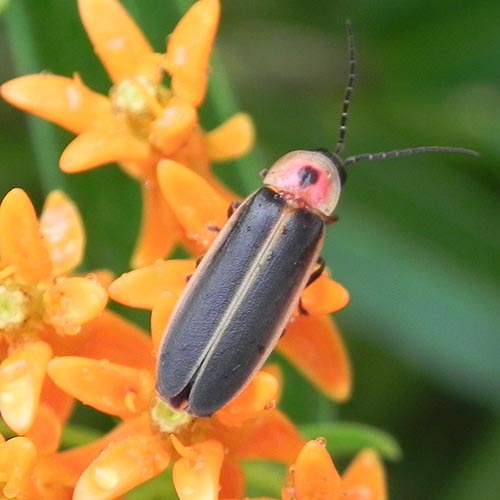
Listen to this Episode:
- From this webpage:
- Find the media player located under the episode picture.
- Click on the green triangle to listen to the audio for this episode.
- From your favorite podcast listening platform:
- Search for “Backyard Ecology.”
Show notes:
This week’s episode of the Backyard Ecology podcast is the conclusion of our conversation with Lynn Faust. Lynn is the author of Fireflies, Glow-worms, and Lightning Bugs: Identification and Natural History of the Fireflies of the Eastern and Central United States and Canada.
In this episode, we continue to just geek out about lightning bugs. Once again, this is a very informal conversation that includes stories and more educational content. If you haven’t listened to the previous episode, then I encourage you to go back and listen to Episode 15, which is part 1 of this conversation.
We ended the previous episode talking about the larvae of the Pyractomena or Spring Tree Top Flasher fireflies and how they are so special because they pupate on the sides of trees where we can see them. And they do this in the late winter / very early spring, basically the late Feb. or early March timeframe in Kentucky and Tennessee. We jump right back into that conversation with Lynn describing some of Pyractomena’s mating behaviors and why they might choose to come out so early.
Much of the story of lightning bugs and fireflies revolves around the theme of just paying attention, making observations, sharing what you see, and asking questions. People doing those things have led to the discovery of new species like the synchronized fireflies of the Smokies and the Low Country Ghost. Other people have been able to help better document the range of a given species like the Pink Flashers. Those activities have also led to recognizing previously overlooked behaviors like the fireflies nectaring on milkweeds. There’s so much out there to learn and discover if we’re willing to open our eyes and pay attention.
Lightning bugs, like many other insects, also face some threats. The main threats to lightning bugs are light pollution, pesticides in the soil, soil compaction, and habitat loss. Lynn talks about these threats and realistic ways that we can make our yards more firefly friendly. She takes a very balanced approach that basically boils down to being aware of how your actions might affect lightning bugs or other organisms and then making the best choices for you and your situation. I, for one, appreciate that balance. Lynn also shares some tips for observing lightning bugs.
Again, if you missed the first part of this conversation, then I encourage you to go back to episode 15 and listen to it. In that episode, Lynn shared the story of how she went from just watching the lightning bugs to becoming “The Lightning Bug Lady.” We also talked about some of the different species found in the eastern U.S., how to identify firefly species, and the general life history of fireflies. I hope you enjoy both these episodes.
Links:
- Lynn’s book and papers
- Fireflies, Glow-worms, and Lightning Bugs: Identification and Natural History of the Fireflies of the Eastern and Central United States and Canada *
- Lowcountry Ghosts 2020 , Phausis sp. firefly
- Milkweed Fireflies: The Occurrence and Behaviors of 5 Adult North American Fireflies, Lucidota atra, Photinus pyralis, Photinus cookii, Pyropyga minuta and Photuris sp. on milkweed Asclepias syriaca
- Other scientific papers by Lynn
- Backyard Ecology’s website
- My email: shannon@backyardecology.net
* Amazon links are affiliate links and I earn a small commission from qualifying Amazon purchases made the link. The commission is paid by Amazon and comes at no extra cost to you, but helps support the costs associated with hosting the Backyard Ecology blog, podcast, and website.
Episode image:
- Firefly on butterfly milkweed
- Photo credit: baloonimals, cc-0

Backyard Ecology: Exploring Nature in Your Backyard
Nature isn’t just “out there.” It’s all around us, including right outside our doors. Hi, my name is Shannon Trimboli, and I am the host of Backyard Ecology. I live in southcentral Kentucky and am a wildlife biologist, educator, author, beekeeper, and owner of a nursery specializing in plants for pollinators and wildlife conservation. I invite you to join me as we ignite our curiosity and natural wonder, explore our yards and communities, and improve our local pollinator and wildlife habitat. Learn more or subscribe to my email list at www.backyardecology.net.

Leave a Reply